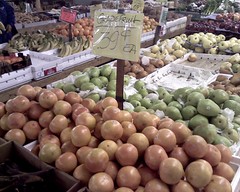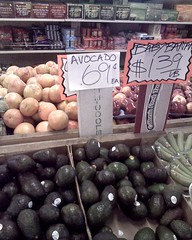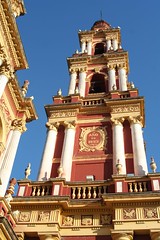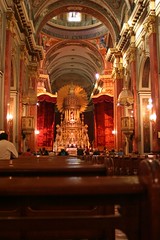
Click photo to see slideshow
or here for all those veggies
When I was traveling through South America, seeing the ridiculously low prices of fruits and vegetables I ranted on this site about our own grocery stores back home and the exorbitant prices they charge us for the same stuff. The only possible explanation for this rip-off is that it’s not a rip-off at all: we are subjected to a first-world standard-of-living tax that generously flows into an altruistic aid program that subsidizes the mom-and-pop grocers of the third world. Right?
It turns out that it doesn't have to be this way; the first-world sucker tax is optional. Upon our return, Angela has been struck by a sudden, lasting attack of anal-retentiveness and decided that grocery shopping needs to be done by a meticulous plan which will result in significant savings. Thus, for the last few months we have been shopping at the “Asian” grocery markets in the International District. I mean “Asian” in the blatant “most people who work there look vaguely Chinese” way. In those nondescript stores along and behind Jackson Street you can find not only the familiar fruits and vegetables sold by the ubiquitous Fred Meyer, Safeway or QFC, but also others that may require an advanced course in exotic foods before you can figure out what to do with them. The quality is nothing to balk at but the prices are the best part – everything is much cheaper than at the mainstream chain grocery stores. You spend 10 bucks and go out with three full bags. I took some pictures of their convincing price tags – and these are winter prices; in summer, the numbers are half.
Unless these guys get all their produce straight from China like Walmart or grow them in their basement closets under halogen light bulbs year-round they would have to buy from the same producers like the big stores. They charge lower prices and obviously manage to stay in business and survive the tough competition. This begs the question, why don’t the major stores sell at comparable prices? The answer is, beyond any economic theory bullshit, because they can. For a variety of reasons, the average white American doesn't shop in Chinatown. If you live in the suburbs you have no choice or you just don’t know better – the Asian groceries are confined to a 5-block stretch along Jackson Street, a small and not too interesting neighborhood south of downtown. However the backbone of the American nation, the soccer moms and baseball dads of Seattle, don’t shop in the I.D. because the place is obviously unclean, unhygienic, unsafe and full of foreigners with dreadful accents, who might as well be terrorists. That leaves the minorities, a handful of liberal hippies and the expert-level white people who – like me – have embraced ethnic diversity. Of course, only as long as it comes to cheap food.






